Ever wondered why we say “Achilles’ heel” or “Between Scylla and Charybdis”? Idioms are those quirky little phrases that make a language colourful, but what’s even more fascinating is the story behind them.
Many of these expressions have roots in real events, traditions, or mythology, and knowing their stories makes them easier to remember.
In this article, we’ll explore 20 popular English idioms based on mythological stories.
Idioms based on mythological stories:
- 1. Achilles’ Heel.
- 2. Pandora’s box.
- 3. Herculean task.
- 4. Between Scylla and Charybdis.
- 5. Sword of Damocles.
- 6. Apple of discord.
- 7. Trojan horse.
- 8. Midas touch.
- 9. Sisyphean task.
- 10. Rising from the ashes like a Phoenix.
- 11. Argus-eyed.
- 12. Cleaning the Augean stable.
- 13. Pyrrhic victory.
- 14. Narcissistic.
- 15. Siren song.
- 16. Nemesis.
- 17. Labyrinth.
- 18. Promethean fire.
- 19. Throw to the wolves.
- 20. Bacchanalian revelry.
- Download PDF
1. Achilles’ Heel:
Meaning –
Weak point; the most vulnerable part in spite of overall strength.
Origin:
When Achilles was born, his mother Thetis, a goddess of sea, wanted him to be immortal. So, she dipped the new born Achilles into the River Styx, whose waters granted invulnerability.
When Thetis dipped her son, she held him by his heel, the only part of the body that remained above the river and, therefore, untouched by the magical water and thus, vulnerable.
Achilles grew up to be the greatest warrior of the Trojan War. He was nearly invincible until an arrow hit his heel and he died in the battle field.

Use –
- John is genius, but his arrogance is his Achilles’ heel.
- The company’s outdated technology turned out to be its Achilles’ heel against the competitors.
- Peter can play well, but his anger sometimes proves to be his Achilles’ heel.
2. Pandora’s box:
Meaning –
A source of endless troubles, complications, unforeseen problems.
Origin –
In Greek mythology, Pandora was the first woman. Gods and goddesses gifted her various attributes like beauty, charm, skill, curiosity. Zeus, the king of the gods, gave her a jar, which, later, mistranslated as a box. Zeus and other gods prohibited her to open it.
But, out of curiosity, Pandora opened the jar/box and from it escaped all the evils of the world – disease, sorrow, toil and death, leaving inside only Hope.
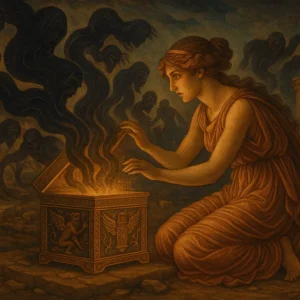
Use –
- Leaking the documents opened a Pandora’s box for the scandal.
- Introducing AI without proper rules may unleash a Pandora’s box of ethical issues.
- Asking her about her past has opened a Pandora’s box of painful memories.
3. Herculean task:
Meaning –
A job or duty that requires great strength, effort, or determination to accomplish.
Origin –
Hercules or Heracles was the strongest hero in Greek mythology. He was assigned twelve nearly impossible labours, for example,
- Slaying the Nemean Lion, a beast with impenetrable skin.
- Cleaning the Augean Stable, which was immensely large and filthy and had not been cleaned for thirty years.
- Capturing Cerberus, a three headed dog that guards the underworld, prevented the dead from escaping and the living from entering.
And so on.
Despite all these, Heracles or Hercules completed all the labours with his great strength.
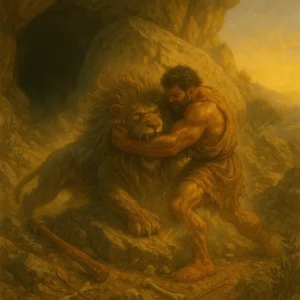
Use –
- Building the bridge in such terrain was a herculean task.
- Negotiating peace between the two nations proved to be a herculean task.
4. Between Scylla and Charybdis:
Meaning –
Between two equally destructive options, where avoiding one can put you at risk of the other.
Origin –
In Homer’s Odyssey, Odysseus had to sail through a narrow strait where on one side larked Scylla, a six-headed sea monster and on the other side, there was Charybdis, a deadly whirlpool. Whichever route he chose, he faced destruction.

Use –
- I am caught between Scylla and Charybdis, staying means a toxic job and leaving means unemployment.
- The investors are in between Scylla and Charybdis balancing risk and profit in volatile market.
- The government is between Scylla and Charybdis, to choose between a huge tariff and partnering with enemy nation.
5. Sword of Damocles:
Meaning –
A constant threat of danger hanging over someone.
Origin –
Damocles was a courtier of the king Dionysius II, the tyrant of Syracuse. He often flattered the king saying how fortunate he was to enjoy such luxury and authority.
Tired of the flattery, Dionysius offered to swap places with Damocles for one day, so that he can experience how it felt like to be a king.
Damocles sat on the golden throne, surrounded by riches, finest food and wine and basked in royal attention.
But above his head, Dionysius had secretly hung a sharp sword, suspended by a single horsehair.
When he noticed the hanging sword above, he realised that the grandeur of kingship is clouded with constant threat of fear, danger and insecurity.

Use –
- The examination date feels like a Sword of Damocles to an aspirant.
- The threat of nuclear war is hanging like the Sword of Damocles above the head of humanity.
6. Apple of discord:
Meaning –
The cause of conflict, dispute or rivalry.
Origin –
In Greek mythology, on the day of Thetis and Peleus’ wedding. All the gods and goddesses were invited except Eris, the goddess of strife and discord.
To take the revenge if this insult, Eris appeared at the feast and threw a golden apple among the guests. On the apple inscribed “To the fairest”.
Three powerful goddesses – Hera, the queen if the gods, Athena, the goddess of wisdom and war, Aphrodite, goddess of love and beauty claimed the apple, thereby indirectly claimed to be the fairest.
Paris, the prince of Troy, was appointed to resolve the dispute.
Each of the three goddesses offered him a tempting bribe. Hera promised power and kingship, Athena wisdom and military glory and Aphrodite promised the most beautiful woman in the world as his wife.
Paris awarded the golden apple to Aphrodite.
In return, with the help of Aphrodite Paris seduced and abducted Helen of Sparta, the most beautiful woman and the wife of King Menelaus. This incident led to the Trojan War.
So, one small thing, an apple caused a great war.
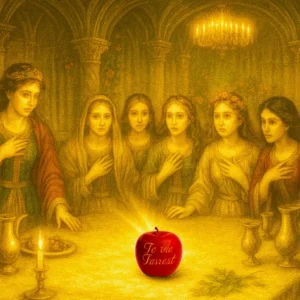
Use –
- The border issue has been the apple of discord for years between the two countries.
- The toy is the apple of discord between the two brothers.
7. Trojan horse:
Meaning –
Something harmful that appears harmless or beneficial on the surface; a deceptive trick to infiltrate or defeat someone.
Origin –
From the Greek myth of the Trojan War, after a long siege, the Greeks built a hollow giant wooden horse filled with Greek soldiers and left it outside Troy.
Trojans thought it was an apparent offering. So, they brought it into the city. At night, the Greek soldiers came out of the horse and destroyed Troy.
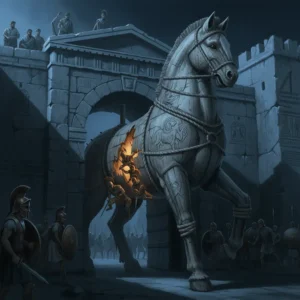
Use –
- The new software update turned out to be a Trojan horse, it slowed down the whole system.
- The freebies will be a Trojan horse, causing economic losses.
8. Midas touch:
Meaning –
The ability to turn everything one undertakes into success, especially in terms of wealth or profit.
Origin –
Midas was a legendary king of Phrygia. Once he did a favour to the god Dionysus by helping his tutor and companion Silenus.
Dionysus then, pleased with Midas’ hospitality, offered him any gift he wished. Midas, as he was greedy, asked for the golden touch, meaning whatever he touched, it would turn into gold.

Use –
- He seems to have Midas touch, whichever business he invests in, it thrives.
- With her Midas touch in fashion, whatever she designs, it becomes a trend.
9. Sisyphean task:
Meaning –
A never-ending, pointless, or futile task that requires continuous effort without hope of success.
Origin –
In Greek mythology, Sisyphus was the king of Corinth. He was a notorious cheater and also known for his trickery.
Some of his notorious tricks include betrayal of Zeus, cheating Death – Thanatos, deceiving Persephone.
Finally, gods decided to send Sisyphus underworld. His punishment was to put a massive boulder up a steep hill.
Every time he reached the top, the boulder rolled down the hill, forcing him to begin again. It continued endlessly.

Use –
- Convincing him with reason is like Sisyphean task.
- Fighting corruption alone is a Sisyphean task.
10. Rising from the ashes like a Phoenix:
Meaning –
Rebirth, renewal, or recovery after destruction or defeat.
Origin –
In Greek mythology, the bird Phoenix lives for centuries. When it reaches the end of its life, it builds a nest, then set it aflame. From the ashes a new phoenix would be reborn.

Use –
- After the destruction during the World War II, Japan rose like a phoenix from the ashes.
- Don’t waste your time, what is lost is lost, rise from the ashes like a phoenix.
11. Argus-eyed:
Meaning –
Extremely watchful, vigilant, or having a keen eye for detail.
Origin –
In Greek mythology, Argus Panoptes was a giant with hundred eyes. Some of his eyes were always open while others slept. He was appointed the watchman of the queen Hera.
After his death, Hera, on his honour, placed his eyes on the tail of the peacock.

Use –
- The Argus-eyed inspector misses no possible evidence.
- There lives an Argus-eyed aunt, always watching who is doing what.
12. Cleaning the Augean stable:
Meaning –
To undertake a huge, filthy, or corrupt mess that requires extraordinary effort to clean up; especially used for tackling long-standing corruption or disorder.
Origin –
According to Greek mythology, a king named Augeas did not clean his enormous stable for thirty years. Heracles or Hercules was assigned the task to clean this stable.
It required Heracles a lot of effort. Heracles channelled the waters of the rivers Alpheus and Peneus to clean it in a single day.

Use –
- The new CEO promised to clean the Augean stables of the corruption of the company.
- After the audit the minister is now focused on cleaning the Augean stable.
13. Pyrrhic victory:
Meaning –
A victory that comes at such a great cost that it is nearly equivalent to defeat.
Origin –
King Pyrrhus of Epirus, who defeated the Romans at the Battle of Asculum in 279 BCE. Although victorious, his army suffered devastation loses.
He remarked, “If are victorious in one more battle with the Romans, we shall be utterly be ruined”.
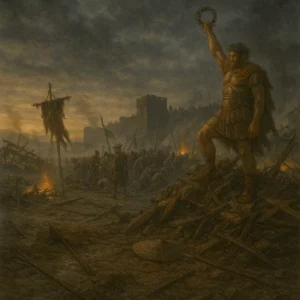
Use –
- Winning the lawsuit was a Pyrrhic victory, the cost almost ruined the company.
- It was a Pyrrhic victory for the team, they lost their best players to injury.
14. Narcissistic:
Meaning –
Excessively self-absorbed, self-loving, vain.
Origin –
In Greek mythology, Narcissus was a beautiful young man. When he saw himself in a pool, he fell in love with his own reflection. Consumed by this obsession, he wasted away and died.
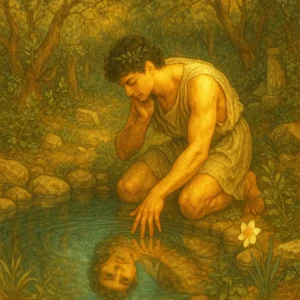
Use –
- His narcissistic attitude makes him lose friends.
- Don’t speak only about yourself, leave this narcissistic behaviour.
15. Siren song:
Meaning –
An irresistible but dangerous temptation; something that is very alluring yet potentially destructive.
Origin –
In Greek mythology, the Sirens were nymphs who lived in the rocky islands and lured sailors with their enchanting songs. Those who listened to the song were drawn to the rocky islands. Ships wrecked and men perished.
Odysseus, on his way home from Troy, sailed past the islands of the sirens.
Following Circe’s advice, Odessius plugged his crews’ ears with beeswax. But he was curious to listen to the Siren songs.
So, he had his men tie him tightly to the mast and ordered them not to release him no matter how much he begged. Thus, Odysseus became the only surviving man who listened to the siren song.

Use –
- The siren song of easy money dragged him to gambling.
- Students should not push themselves to the siren song of social media.
16. Nemesis:
Meaning –
A long-standing rival, arch-enemy, or an agent of downfall; also refers to unavoidable retribution or fate.
Origin –
In Greek mythology, Nemesis was the goddess of divine retribution and justice. She punished excessive arrogance, pride ensuring no one could escape their downfall.
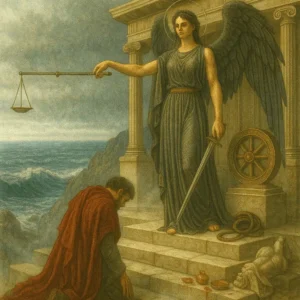
Use –
- Don’t hurt others or you’ll face the nemesis in the end.
- The young player became a true nemesis for the champion.
17. Labyrinth:
Meaning –
Extremely complicated, intricate, or confusing—like a maze that is hard to navigate.
Adj – Labyrinthine.
Origin –
Labyrinth was a vast and complex maze built by Daedalus for King Minos of Crete to imprison Minotaur, a part human part bull monster.
The maze was so intricate that once one entered, it was nearly impossible to come out of it even with proper guidance.

Use –
- The city’s labyrinthine streets confuse the tourists.
- The labyrinth of the red-tapism hamper the ease of doing business.
18. Promethean fire:
Meaning –
A symbol of bold creativity, innovation, or knowledge, often comes at a great risk.
Origin –
In Greek mythology, Prometheus, a Titan, defied Zeus by stealing fire from the gods and giving it to humanity. The fire represented knowledge, technology and civilization.

Use –
- The speech was like a Promethean fire; motivated the youth to work harder.
- Art is often seen as a Promethean fire; both inspiring and dangerous.
19. Throw to the wolves:
Meaning –
To sacrifice or abandon someone to danger, blame, or hardship in order to save oneself or others.
Origin –
From a European folklore where wolves are considered a predator. Travellers should sometimes throw some animals or even people as scapegoats towards a pursuing wolf to protect themselves.

Use –
- The manager threw his driver to the wolves to protect himself from a police case.
- The whistleblower was thrown to the wolves by the very company he tried to protect.
20. Bacchanalian revelry:
Meaning –
Wild, noisy, and drunken celebration; excessive indulgence in pleasure and festivity.
Origin –
Bacchus was the Roman god of wine, festivity, theatre, and ecstasy. Festivals in his honour were called Bacchanalia, which later gained a reputation for wild, excessive revelry.
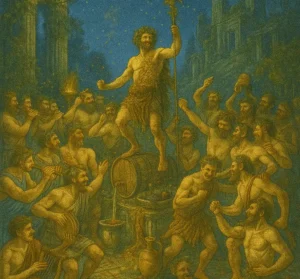
Use –
- The party soon turned into a Bacchanalian revelry.
- The novel depicts the corrupt elite indulging in Bacchanalian revelry.
Click here to download a printable PDF of the 20 English Idioms Based on Mythological Stories.
Thank you…

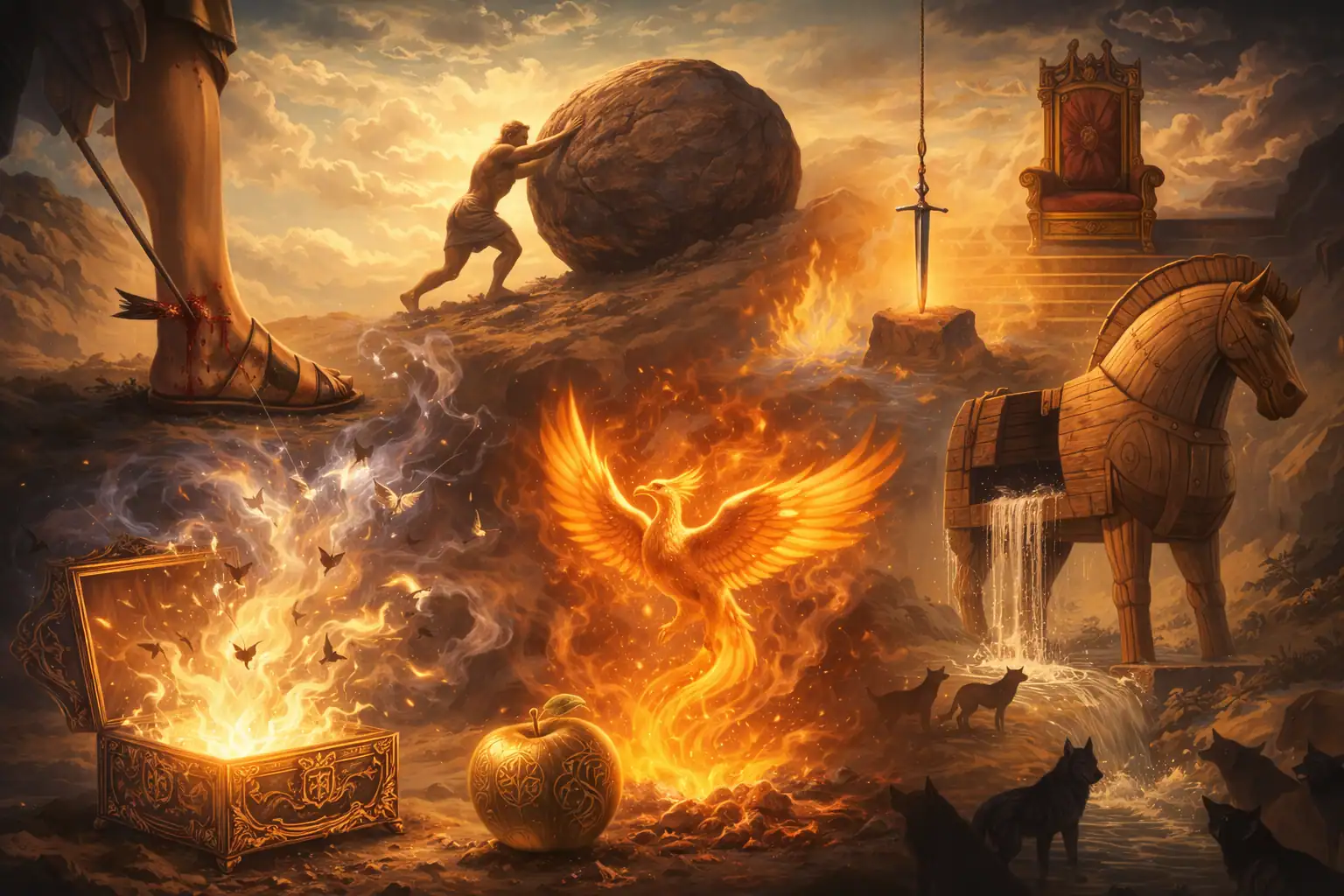
This was very interesting you should add more idioms to the website though